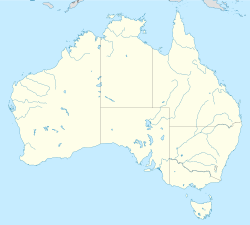| Location | Carinda, Walgett Shire, New South Wales, Australia |
|---|---|
| Coordinates | 30°47′13″S 147°28′41″E / 30.78694°S 147.47806°E |
| Length | 200 m (660 ft) |
| Width | 200 m (660 ft) |
| History | |
| Periods | Pleistocene |
| Cultures | Prehistoric Australia |
| Site notes | |
| Excavation dates | 1933, 1991–2009 |
| Archaeologists | Judith Field Richard Fullagar |
Cuddie Springs is a notable archaeological and paleontological site in the semi-arid zone of central northern New South Wales, Australia, near Carinda in Walgett Shire. Cuddie Springs is an open site, with the fossil deposits preserved in a claypan on the floor of an ancient ephemeral lake. The claypan fills with water after local rainstorms and often takes months to dry, a fact which facilitated the survival of fossils over a long period of time.
The site provided the first unequivocal association of stone artefacts with fossil remains of Australian megafauna.[1] Cuddie Springs has been known as a fossil megafauna locality since the late 1870s, when a well was sunk into the centre of the claypan. The Australian Museum launched excavations in 1933 and while many bones were found, no archaeological discoveries were made in that initial research. More extensive excavations were conducted between 1991 and 1996 by a team from the University of New South Wales and were continued between 1997 and 2009 through the University of Sydney.
- ^ Field, Judith; Wroe, Stephen; Trueman, Clive N.; Garvey, Jillian; Wyatt-Spratt, Simon (8 February 2013). "Looking for the archaeological signature in Australian Megafaunal extinctions". Quaternary International. Peopling the last new worlds: the first colonisation of Sahul and the Americas. 285: 76–88. Bibcode:2013QuInt.285...76F. doi:10.1016/j.quaint.2011.04.013. ISSN 1040-6182.
